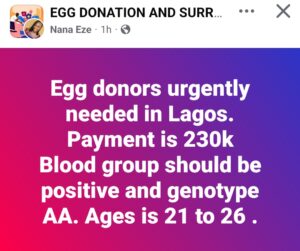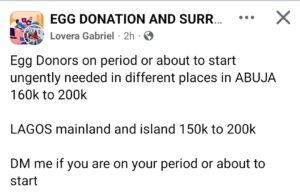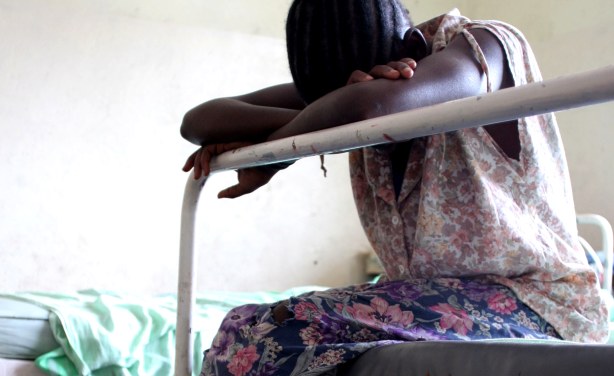A disturbing reality has played out for years without the knowledge of many: an unregulated ovum-trading industry has been preying on vulnerable young women, especially students of Nigerian universities and other tertiary institutions. With no clear national law governing egg donation, many clinics and fertility centres are operating without transparency or accountability. Some of their activities are shrouded in secrecy with exploitative motives at the expense of women’s health, ALAO ABIODUN reveals.
“There is this offer that I know that can help improve your financial situation as a student, and that is selling your eggs. It will make you better off. These eggs are being flushed out of your body anyway. At least the eggs that you have no need of can be put to use for someone else and you even get paid for it handsomely.” …CONTINUE READING

Those were the words of a woman in her mid-forties re-echoed by 22-year-old Imade Ayodeji (not her real name).
The woman in question had walked up to Imade, posing as a medical expert while she was reading in the school garden on a cool Friday evening.
To Imade, the monetary offer came at the right time. She is one of the many young ladies who have had to sell their eggs to meet their financial needs. It has helped to fund her education and also provide her a temporary relief from financial struggles.
Imade said her family was struggling to make ends meet, and could not provide for her anymore.
Evening Roundup: Stories making waves in The Nation – The Nation0:03 / 1:00
Investigations by The Nation revealed that over the years, many young females in secondary and tertiary institutions in Nigeria have embarked on egg donations in order to make quick money. In the process, many of them run into quack doctors whose actions may affect their health.
A recent advert seen by our correspondent on a Facebook group “Egg Donation and Surrogacy” reads: “Egg donors on period or about to start ungently needed in different places in Abuja 160k to 200k; Lagos mainland and Island 150k to 200k. DM me if you are on your period or about to start”.
The post elicited flurry of comments with many expressing their intents.
Over the years, many fertility clinics, usually through their agents, have been profiting from the misery of these ignorant young girls, turning a blind eye to the health challenges they encounter afterwards.
Findings by our correspondent revealed that these individuals who pose as agents or middlemen also profit from the exploitative act. They try to influence donors through monetary and non-monetary benefits, especially to see the donation as natural and fulfilling.
Twenty-year-old Chiamaka, a female undergraduate (not her real name), said: “Agents will come and meet you. They’ll also tell your fellow students to talk to you about it too.
“It starts from them telling you to donate blood for money.
“Do you know how much pressure I was under to sell my eggs in my 200 level?
“They will sweet-talk you and tell you it is 150k (N150,000) per egg and you will only take one injection.
“They would not tell you how the injections will affect your overall health o…
“You can make like N7,000 per pint of blood, and you can donate up to 4 pints.
“But do you know if you donate your egg, you can get 150k? And it is only one egg o.
“You can also donate multiple times.
“I remember those words like mad. There’s so much to unpack,
“Why are they in school environment? They are targeting students because they know they are a vulnerable population.”

For many young female undergraduates, the pressure of survival lead them to make choices no child should ever have to face.
In many developed countries like the United States, New Zealand and Australia, there are laws guiding IVF and other assisted reproductive techniques, but these are non-existent in Nigeria.
In the US, for instance, it is legal for a woman to donate eggs either anonymously or not. She can also receive between $30,000 to $50,000 as compensation.
Read Also: Trump, immigration and capitalism’s global crisis
The donor is required to sign a contract that ensures she does not have any legal rights or responsibilities to any resulting children or embryos.
Although the woman who receives the egg will not be a genetic relation of the child, legal documents will record her as the birth mother.
In New Zealand, Canada and France, monetary compensation is banned outrightly.
A research titled: “Analysis of Level of Awareness of Health Risks Associated with Egg Donation among Female Undergraduates of Universities in Nigeria” revealed that there is generally a low level of awareness of health risks, as well as procedures associated with egg donation among female undergraduates.
These females revealed that the financial inducement they received from the process was not worth the donation.
What is egg donation?
Egg donation involves an egg cell, also known as an oocyte, being extracted from a donor and utilised to create an embryo during the process of In Vitro Fertilisation (IVF).
Egg extraction procedure, also known as egg retrieval, is a minimal surgical procedure that removes eggs from the ovaries. The procedure is typically performed in a hospital or fertility clinic under sedation or general anaesthesia.
The process of egg donation is neither simple nor without risks involved. Women are subjected to a series of hormonal treatments designed to stimulate their ovaries to produce multiple eggs.
The side effects can be severe, ranging from mood swings and weight gain to more serious complications such as Ovarian Hyper Stimulation Syndrome (OHSS).
After some minutes, the doctor places her in a surgical suite in the clinic. She is given intravenous sedation to minimise discomfort during the procedure.
A thin needle, guided by ultrasound, is driven through her vaginal wall to reach the follicles that contained eggs. The needle is connected to a suction device and test tube, and the fluid and eggs are pulled into it.
The process is repeated for other follicles in both ovaries. She is later taken to a recovery room and allowed to rest for a few hours.
That done; the eggs are examined and taken to a laboratory for evaluation and preparation.
Donors are selected based on maturity for fertilisation.
Eggs extraction process
1. Ovarian Stimulation – The person takes hormonal injections for about 10–14 days to stimulate multiple follicles (which contain eggs) to mature in the ovaries.
2. Follicular Monitoring – Ultrasounds and blood tests track follicle growth and hormone levels to determine when the eggs are ready for retrieval.
3. Trigger Shot – A final injection (hCG or Lupron) is given about 36 hours before retrieval to induce final egg maturation.
4. Egg Retrieval (Transvaginal Ultrasound Aspiration)
A thin needle is inserted through the vaginal wall (not through the abdomen, and no external cuts are made). The needle is guided by ultrasound to reach the ovaries. The doctor suctions out the fluid from each follicle, which contains the eggs. The procedure usually takes 10–20 minutes.
5. Egg Processing – The extracted fluid is examined in a lab, and mature eggs are isolated for freezing or fertilization.
Selection criteria for egg donors
According to one of the terms of agreement seen by our correspondent with respect to the ovum trading deal, some of the conditions to be met includes: “Egg donor may be or may not be known to the recipient couples
“Healthy, between the ages of 21 and 27 years with no known history of mental disorders.
“No family history of genetic or inheritable diseases.
“An egg donor will go through the IVF process of drug injection and vaginal ultrasound egg collection, allowing her eggs to be given to the recipient.”
Once the eggs are collected from the donor, they are fertilised with sperm from the recipient’s partner.
Although it is possible to transfer embryos two or three days later, embryos are more usually frozen for transfer later once the recipient’s uterine lining has been prepared for pregnancy with hormone tablets of estrogen and progestogen.
Why multiple eggs?
Unlike the normal menstrual cycle, where typically only one egg is released, IVF stimulation aims to mature multiple eggs to increase the chances of success. Usually, 5–20 eggs are retrieved, depending on the person’s response to the medication.
Egg donation side effects include mild bloating, abdominal pain, breast tenderness, and mood swings, typically resolving post-treatment. Rare risks like ovarian hyperstimulation syndrome (OHSS) affect ~1% of donors, possibly needing medical care. Long-term health risks aren’t confirmed, but research is limited, leaving some uncertainty
Generally, egg and sperm donation is no different from blood donation, apart from the differences in the donation process. Of the three tissues, egg donation has the more robust process, requiring a regimen of injections over a period of time. Sperm donation, on the other hand, has the simplest process that could last less than five minutes to conclude.
Who owns the baby?
One of the many conundrum that has been recurrent in the ovum-trading discourse is that of genetics, and the question of who owns the baby?
Buying and selling of female eggs or donating sperm have become one of the recent public health concerns and the practices have generated global discussion involving its ethical, religious, physical, social and health risks as regards to the egg donor.
A scenario of a male student who donated his sperm was painted. He asked whose baby will it be if he donates his sperm to a woman and she gets pregnant and eventually delivers a baby? Whose child would he see the baby as — his or the ‘foster’ father’s?
This scenario was extended to the level of the society — how will the society see and treat the child born with a donated egg or sperm?
Victims recount ordeal
During a visit by our correspondent to one of the fertility clinics in Lagos, the atmosphere reeked of exploitation as teenage girls were reduced to mere commodities who were there for ovum trading in exchange for money.
It was not a place anyone chose to stay, but for some girls, it was the only choice left. Fertility clinics are now a pleasant home for them — the price of survival paid with trading their eggs.
An agent, addressing potential donors, told a story of how donors do not read through agreements before signing up.
She said: “A lady went to donate at a clinic on Lagos mainland. She was given a form to sign. Instead of reading through it, she just signed.
“After donating, she was paid N20,000 because they only retrieved six eggs. She started causing trouble, only for the nurse to show her the form she signed and it was written there that if they got less than 10 eggs she would be paid N20,000.
“If she had read through and understood the terms, she would have known and likely back out.
“A surrogate who signed a contract and didn’t read it was not paid after delivery and she started calling the agency and sending people to call them, only for her documents to be shown to her guarantor and it was stated clearly that delivery fee would be paid two weeks after delivery, and she signed.
“If she had read through it, she would have known what was written in the document.
Related News
“Please, always learn to read and understand posts and payment plan,” she urged.
Some of the female donors, who pleaded anonymity, spoke with our correspondent.
One said: “I was introduced to it. I was just too scared to do it. A lot of my hostel mates did.
“The worst part of it was that just a few of them used it to sort life issues. The rest bought shoes, bags and hair at that time. Chocolate Weavon was the bane of our existence then.
“It’s less than N150K. I paid my agent N30K, the nurses N20K, so I left with 100K, I think. I was so desperate and it seemed like the only thing I could do then.”
Another lady said: “I almost did in 2016/17. We even went to a hospital at Maryland but I couldn’t go through with it when they said I’d have to be injecting myself and store the injections inside the freezer.
“I didn’t have a freezer at the time, so I just let go.
“Funny enough, I met the girl that took me there at a job interview. She had done it herself and didn’t see it as a big deal.
“Me on the other hand didn’t know what I wanted to do. Just needed the money for my tuition and other school expenses.
“Thank God it didn’t work out”.
Explaining how a family friend was down with a life-threatening illness, Ms. Kemi said: “A family friend, after waiting for 10 years without a child, did IVF, and boom she had OHSS (Ovarian hyperstimulation Syndrome).
“Her tummy was so bloated we thought she was pregnant. She was the doctor’s first patient and there was no compensation.
“The doctor was just doing trial and error. She got her health damaged.”
UI raises health advisory on egg donation
The University Health Service of the University of Ibadan recently issued a health advisory against a growing trend of recruitment of its female students for egg donation for In-Vitro Fertilisation (IVF) by individuals, agents or agencies.
The university warned that while egg donation remains the hope of many families struggling with infertility, the measure should not be considered a permanent source of income or an alternative “side hustle” by members of the university community, particularly female students.
The memo with the title: “Health Advisory on Egg Donation”, reads in part: “It has come to our attention that there is a growing trend within the university community involving the participation and/or recruitment of female students as egg donors for In-Vitro Fertilisation (IVF) by individuals, agents, or agencies.
“While egg donation has brought hope to many families struggling with infertility, it is important to note that it should not be considered a permanent source of income or an alternative ‘side hustle’’’.
Speaking on the health implications, the memo explained that “egg donation involves the use of hormonal medications to stimulate the ovaries. This process carries several short-term risks, including abdominal pain, breast tenderness, bloating, mood swings, Ovarian Hyperstimulation Syndrome (OHSS), infection and bleeding, ovarian torsion, potential injury to the bladder, nearby blood vessels, and bowel and psychological distress.”
Warning that the long-term effects reported by some egg donors include loss of fertility, the institution says it is important to note that current research is still inconclusive regarding who is medically safe to donate, how many times donation can safely occur and the ideal interval between donations.
Existing regulation on egg donation
The National Health Act of 2014 is the only law that attempts to regulate egg donation in Nigeria, but it doesn’t directly address it. Section 53 criminalises the buying or selling of any human tissue, blood or blood products, and since eggs are considered human tissue, this creates a legal grey area.
Egg donation itself isn’t explicitly illegal. There are no regulations or clear rules specifying who can donate eggs, how often or what compensation is fair.
As a result, many young women go through the process without proper counselling, medical support or clear information, leaving them vulnerable to exploitation.
Last year, the House of Representatives mandated its Committee on Healthcare Services to investigate the spate of illegal egg donations and practice of assisted reproductive health technologies in Nigeria.
The House urged the Federal Ministry of Health and Social Development, and the Ministry of Women Affairs to create support systems for women who have participated in egg donation to help address health complications and psychological impacts.
Consequently, the lawmakers urged the Ministry of Health and Social Development, and the Ministry of Information and National Orientation to intensify public awareness initiatives focusing on the risks and ethical considerations of egg donation to help inform potential donors and discourage exploitation.
These resolutions followed the adoption of a motion on illegal Harvesting and Commercialisation of Human Eggs in Nigeria moved by Hon. Kwamoti Bitrus La’ ori.
La’ori noted that the commercialization of human eggs, particularly in the context of illegal harvesting, poses significant ethical, legal and health concerns globally as the issue has gained prominence due to a growing demand for assisted reproductive technologies amid insufficient regulations in Nigeria.
The lawmaker also noted that Nigeria’s healthcare system, particularly reproductive health, is still evolving, coupled with increasing infertility rates among couples seeking assisted reproductive treatments, thus leading to a flourishing market for human eggs.
She recalled that in 2021, Nigerian authorities discovered an illegal egg harvesting scheme in Lagos, where a network of medical professionals and agents lured young women, mostly students or low-income earners, with the assurance of monetary rewards for their eggs. Reportedly, women received between N200,000 and N500,000, or $120 to $300, for their participation, which is below international pricing standards.
Furthermore, the lawmaker recalled that “in 2022, an Abuja based fertility clinic was found in the illegal commercialization of human eggs to foreign clients, enrolling women under false claims of being part of legitimate egg donation programmes.
“Reports suggest the clinic’s online platform is inflating egg prices for international couples, underscoring the need for robust Nigerian regulatory frameworks to regulate fertility practices
“The absence of comprehensive legislation governing reproductive health in Nigeria has allowed these illegal activities to thrive.
“While the National Health Act provides some guidelines for reproductive health, specific regulations regarding egg donation and commercialization are lacking.
“Due to the effects of the worsening economic situation in the country, this illegal practice has thrived, with many young women seeking financial relief falling prey to unscrupulous practitioners who exploit their desperation for financial relief, ignoring the health risks associated with egg retrieval procedures as well as the unethical commodification of human life and the psychological impact on donors.”
Experts weigh in
According to medical experts, some women often ignore that actions taken against the natural state of their bodies can lead to serious consequences. Whether it’s abortion, egg donation, plastic surgery or Brazilian Butt Lift (BBL), it’s clear that these choices can have significant repercussions that one should be aware of.
Generally, egg and sperm donation is no different from blood donation, apart from the differences in the donation process. Of the three tissues, egg donation has the more robust process, requiring a regimen of injections over a period of time. Sperm donation, on the other hand, has the simplest process that could last less than five minutes to conclude.
Arguing in defence of egg donation, a medical doctor, Dr. Anifowose posited: “Less than 1% of the cases of eggs retrieval are serious, there’s no overall health affected asides the temporal side effects like mood swings, pain and bloating.
“The eggs you don’t use get destroyed in your body and come out through menstruation every month. It’s simply your choice.
“The only thing is a lot of these people exploit women by not paying reasonably. You can still have 20 children after the process if you want.”
A popular Twitter doctor based in the United Kingdom, Olufunmilayo Ogunsanya, on his verified “X” page said: “So you believe internet alarmists telling you they “didn’t know the risks” to such a serious medically invasive procedure like egg retrieval? You are allowing these clowns who are not ready to take responsibility for their own actions gaslight you?
“Except the procedure was done in an abbatoir or an unlicensed clinic, there’s no way they were not properly educated about the risks.
“If they are saying where they went is a dodgy unlicensed centre, then yes, maybe. And they should mention the name of the place.
“But if it is not an unlicensed centre, please stop allowing people who later regret their actions and evade accountability by hiding under “ignorance” bamboozle you with sob stories.”
A lawyer, Sunday Benjamin, argued: “Egg donation is illegal. Informed consent must be clear, voluntary, and based on full disclosure of risks.
“If a clinic or agent lied, withheld crucial details or pressured someone into donating eggs, the consent is invalid, and those exploited may take legal action.”
Similarly, Dr. Ose Etiobhio said: “Any hospital that takes consent without telling you the risk is a dangerous hospital. They must tell you the frequent and complicated risks.
“Egg donation consent form is just like you being planned for a caesarean section or a brain surgery.
“It’s a procedure that has its risks, and any good clinician must never hide that.
“It’s common knowledge. But a few Nigerian clinics would hide this from you.
“They know the risk, even the facilities explain the procedure to you before coming for the d-day procedure, because they need you to be on your third day of menstruation.
“Some girls just do it because they feel they can reproduce more eggs.”
Health expert, Dr. Benedict, said: “It’s deeply troubling to learn about the rampant and exploitative egg harvesting practices in our country.
“Our young women, driven by financial needs, are unknowingly putting their health and lives at risk.
“This isn’t just a health crisis, it’s a violation of human rights.”
Parenting coach, Wendy Ologe who wrote on “The Dark Side of Nigeria’s Egg Harvesting Industry: A Silent Exploitation of Young Girls, lamented that Nigeria has become a hub for the egg harvesting industry, with many fertility clinics and hospitals engaging in the trade of human eggs for assisted reproduction.
She said: “Beneath this seemingly scientific and medical process lies a dark and deeply troubling reality young girls, often from vulnerable backgrounds, are tricked, coerced, or lured into selling their eggs for a fee.
“Many of these girls, some as young as 18, have no real understanding of what egg donation entails. They are promised large sums of money, only to be exploited, manipulated, and left with long-term health consequences both physically and emotionally.
“Egg harvesting requires a woman’s ovaries to be stimulated with powerful hormones to produce multiple eggs, which are then retrieved through a medical procedure.
“In Nigeria, many desperate or unsuspecting girls are recruited under false pretenses.
“The recruiters often target young women from villages, universities, or economically disadvantaged backgrounds, promising them financial rewards and a simple, risk-free process.
“These girls are then taken to fertility clinics sometimes in Abuja, Lagos or other major cities where their bodies are subjected to rigorous medical procedures without proper explanations or consent.
“Many are misled about the risks, lied to about their own eggs being “bad” or “useless,” and ultimately paid far less than what they were promised.
“Some don’t even realise they’ve undergone an invasive procedure until it’s too late.”




